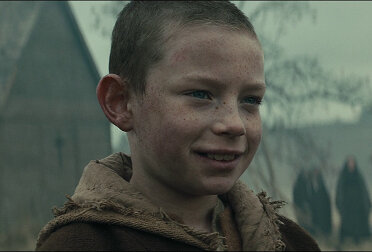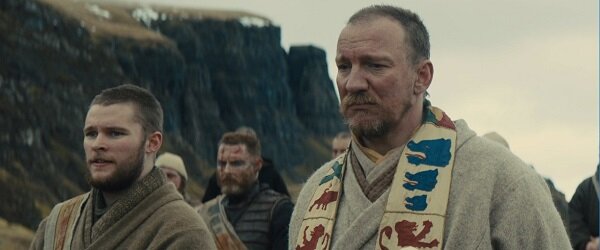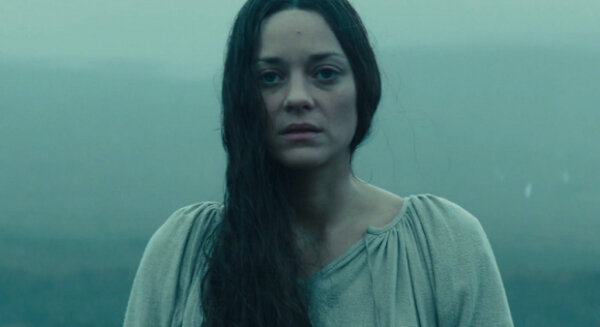Film Review - 'Macbeth'
I had hoped to catch this film at the cinema when it was released in 2015 but, for reasons I cannot remember, that didn’t happen.
‘Across a war-torn and unforgiving landscape, fearless warrior and inspiring leader Macbeth returns home, having encountered three witches on the bloody battlefields who foretell of a prophecy that he shall be the next King. Although initially sceptical, Macbeth and Lady Macbeth’s growing ambition and thirst for power soon leads to murder, unleashing a savage and inescapable spiral of bloodshed and madness.’
Macbeth is not a Shakespeare play I’m overly familiar with, but there are certain parts that stick in the memory, mainly because of the imagery the words invoke.
As the film opens, it’s clear director Justin Kurzel’s version isn’t going to be ‘true-to-the-play’.
Instead of the witches, we’re witnessing a funeral – Macbeth, played by Michael Fassbender, and Lady Macbeth, played by Marion Cotillard, are burying their small son.
Michael Fassbender as Macbeth
Marion Cotillard as Lady Macbeth
Amongst those present are Macbeth’s best and loyal friend, Banquo, played by Paddy Considine, and his young son, Fleance, played by Lochlann Harris.
Paddy Considine as Banquo
Lochlann Harris as Fleance
It’s only after the funeral, as the camera lifts to focus away from the mourners, do we see the watching witches.
Here, again, is another difference as we see not three, but four figures. Then again, in the play, if we count Hecate, there are four witches.
The witches
The oldest witch is played by Seylan Baxter and the middle-aged one by Lynn Kennedy.
Interestingly, two of the witches are much younger – a young woman, played by Kayla Fallon, who is cradling a baby when we first see them, and a little girl, played by Amber Rissman.
They speak the familiar words…
“When shall we meet again?
In thunder, lightning, or in rain?”
… and finishing with
“Fair is foul, and foul is fair;
Hover through the fog and filthy air.”
So, the words that open the play are the first ones that are uttered in the film.
Macbeth, Thane of Glamis, prepares to lead his men, including boy soldiers, in battle against the traitorous Macdonwald.
The battle is merciless, looking more like a horrific nightmare with lingering, slow-motion shots of bloody, fatal blows.
As Macbeth approaches Macdonwald, ready to deliver the killing blow, the film cuts to Duncan, the king of Scotland, played by David Thewlis, being told the details of Macbeth’s victory.
David Thewlis (R) as Duncan and Jack Reynor as Malcolm
Then his son, Malcolm, played by Jack Reynor, enters with the other traitor, the Thane of Cawdor.
Duncan strips Cawdor of his title and condemns him to death. He then decides to give the title to Macbeth as a reward for his victory.
Back on the battlefield, after the battle, as they’re dealing with their dead, Macbeth and Banquo see the witches through the mist and wonder if they’re real or apparition.
When Macbeth bids them speak, they greet him with prophetic words:
“Macbeth. Hail to thee, Thane of Glamis.
Macbeth. Hail to thee, Thane of Cawdor.
Thou shalt be king hereafter.”
Oblivious to the Thane of Cawdor’s fate and believing him to still be alive, both men are bewildered.
Banquo seems to feign amusement and wants to know why the witches have spoken so favourably to Macbeth but not to him.
They then turn to him…
“Lesser than Macbeth, and greater.
Not so happy, yet much happier.
Thou shalt get kings, though thou be none…”
The women walk away, disappearing into the mist, ignoring Macbeth as he calls to them to speak some more.
Although both men smile as if it’s all a jest, they’re clearly unnerved.
Then Duncan’s messengers bring Macbeth the news that he’s now Thane of Cawdor. He and Banquo quietly discuss what the witches’ words might truly mean.
After Macbeth meets with Duncan, who greets him not only as Thane of Glamis but of Cawdor too, the king says he will join Macbeth at his home in Inverness.
This is when we get our first sight of Macduff, played by Sean Harris.
Sean Harris as Macduff
Macbeth takes his leave to return to Inverness, telling the king he’ll write to his wife to tell her to prepare for Duncan’s arrival.
We join Lady Macbeth as she reads her husband’s letter, which informs her of the strange visit from the “weird sisters” and their prophecy.
It doesn’t take her long to want the prophecy fulfilled, stating Macbeth will be king. And she isn’t willing to wait for nature to take its course.
By the time Macbeth returns, ahead of Duncan and his entourage, Lady Macbeth has already decided on the path to be taken.
Kurzel maintains a strong focus on the lead characters and their performances are stupendous.
Fassbender’s portrayal of Macbeth is masterful – tortured, wracked with guilt and gradually descending into madness. He infuses Macbeth with admirable qualities, making it easy to see why the man is a respected and loved leader. His masculinity never comes across as macho posturing, if that makes sense.
His expressions – always subtle, never over-the-top – add layers of meaning to his words and actions.
There were times I had the impression he no longer felt in control of events but was, instead being pulled along, unable to resist.
Marion Cotillard. What an amazing actress.
Her Lady Macbeth is strong, stronger it would appear than her husband. Yet, her vulnerability isn’t far from the surface.
I liked that she isn’t driven purely by ambition. The loss of her child and lack of children play a huge part in her actions.
The importance of children throughout the film is highlighted with the child’s funeral at the beginning; the child-witch and baby; Banquo’s son, Fleance… All underline the childless condition of the Macbeths.
And wasn’t that a woman’s most valued contribution – to produce an heir?
In the absence of a child, an heir, Lady Macbeth focusses her attention on fulfilling the prophecy making her husband king.
Cotillard’s performance, like Fassbender’s, is understated and all the more powerful for it.
One of the changes Kurzel made was to do away with the gentlewoman and the doctor and their lines in the ‘out, damned spot’ scene.
Instead, Cotillard sits alone on the chapel floor. She speaks her lines quietly but the depth of emotion on her face… She can convey so much without having to physically do very much at all.
Of the other performances, I liked Paddy Considine’s Banquo. A good man, loyal friend and attentive father, his despair at his friend’s descent requires no exaggerated drama. His portrayal was another that benefitted immensely from its understated quality, adding to the poignancy of his character’s fate.
It’s only near the final scene that we see the most of Macduff and Sean Harris played the part effortlessly.
It’s easy, I suppose, to go down the melodramatic route given the fury and grief that consumes Macduff. But Harris’ performance shows the reality of a man struggling not to buckle under the weight of immense loss.
Special mention goes to the witches. It was wonderful to see them portrayed as real people and not caricatures.
I enjoyed – if that’s the right word for such a grim story – this film more than I thought I would.
Filmed in England and Scotland, the settings, especially the haunting beauty of the Isle of Skye, enhanced the atmosphere of dread and encroaching tragedy.
The cinematography is stunning, making full use of rolling landscapes, functional architecture and the ever-present mist.
The muted colour palette makes the occasional flash of red more startling. By the time we get to the final scene, everything is bathed in oranges and reds. The colours used suited this grim, bloody tragedy.
The imagery lingers long after the film has finished…
Macbeth and his men binding their swords to their hands so as not to lose their grip on them when they’re covered in blood and rain…
The way Birnam wood comes against Macbeth at Dunsinane hill…
The music, by Jed Kurzel, is bleak and uneasy, echoing the characters’ emotions, complementing the atmosphere of the film.
The original, Shakespearean language is used, and the actors speak in a Scots brogue, which added another layer of authenticity.
Some of the accents may be a bit ‘off’, but with the calibre of acting on show, it is a very minor quibble.
Even though, as I said, I’m not that familiar with this play, I was aware that certain iconic scenes aren’t in the film, namely the cauldron scene with the witches and the famous lines:
“Double, double toil and trouble;
Fire burn, and cauldron bubble.”
Neither did we have
“By the pricking of my thumbs,
Something wicked this way comes.”
In my opinion, far from messing with the crux of the story, omitting certain parts only served to narrow the focus straight to its heart.
So, if you’re a Shakespeare ‘purist’, this film may not be for you as you might be highly annoyed at the ‘missing’ scenes, which include more than what I’ve mentioned.
Personally, I’m glad I finally got the chance to watch this film, and it’s one I will most definitely watch again.













